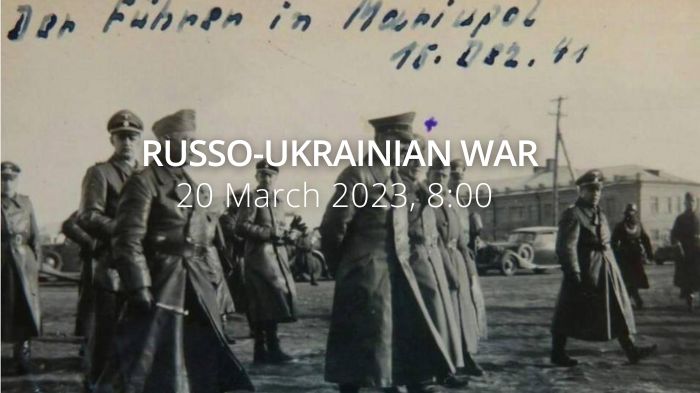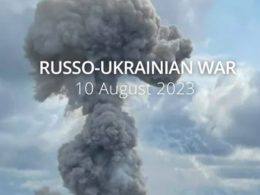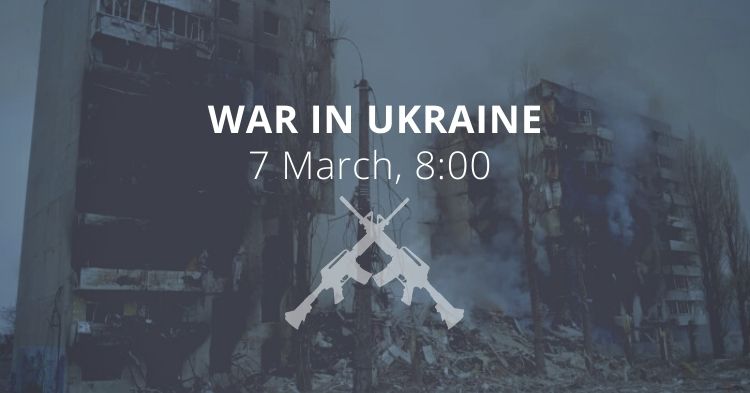Putin visits Mariupol 2023
— Dr. Emma (only here for the trolls) Briant (@EmmaLBriant) March 19, 2023
Hitler visits Mariupol 1941
HT @johnpaul_newman photo on the right pic.twitter.com/rPOf3r4Y57
Daily overview — Summary report, March 20
A map of the approximate situation on the ground in Ukraine as of 00:00 UTC 20/03/23. pic.twitter.com/3bwPbmBOSB
— War Mapper (@War_Mapper) March 20, 2023
The General Staff’s operational update regarding the Russian invasion as of 18.00 pm, March 20, 2023 is in the dropdown menu below:
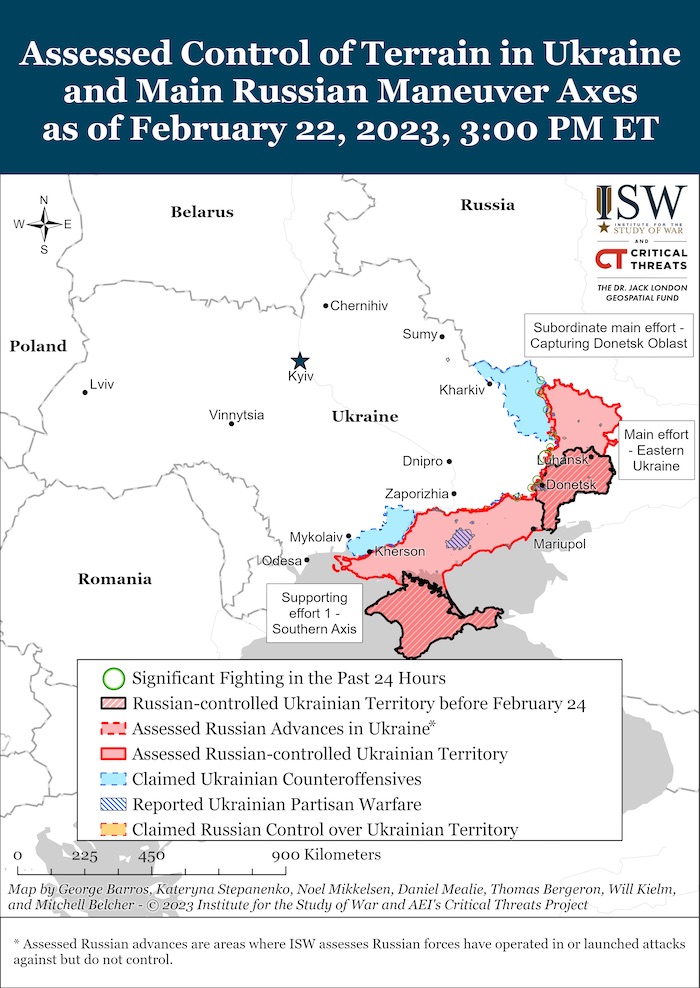
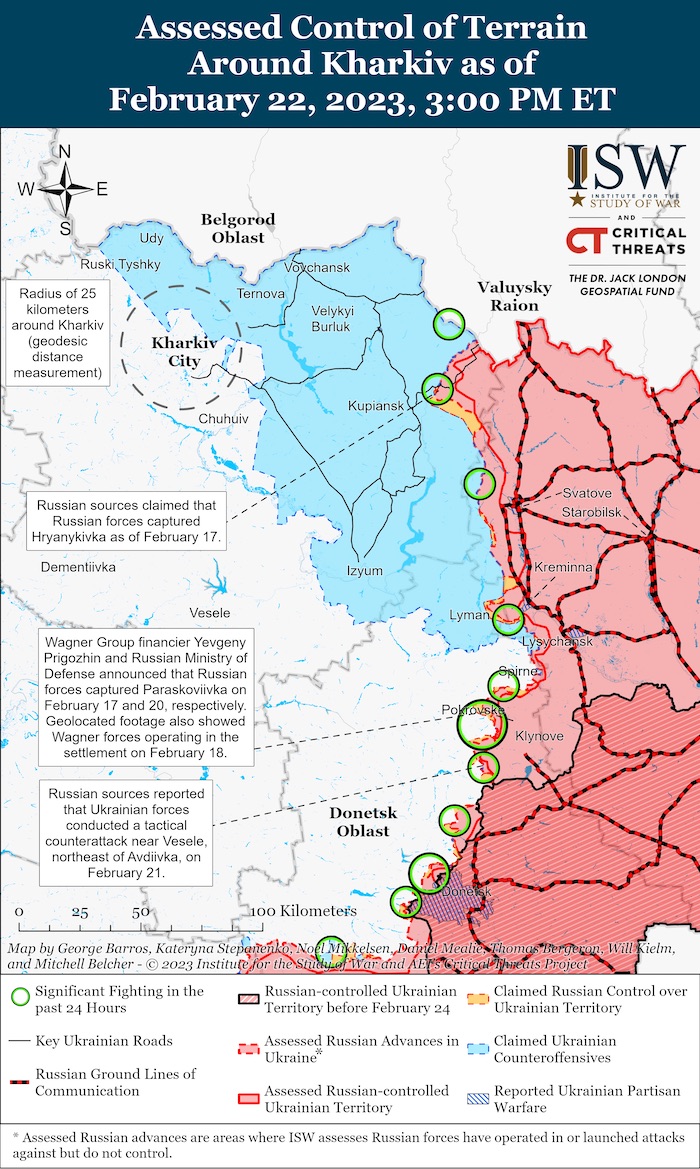
- Volyn, Polissya, Sivershchyna, and Slobozhanshchyna axes: the operational situation has not changed significantly. The training of units of the territorial troops of the armed forces of the Russian Federation continues at the training grounds of the Republic of Belarus. During the day, Russian forces shelled the areas of Hrinivka, Klyusy, Oleksandrivka and Kamianska Sloboda settlements of Chernihiv region; Sopych, Kharkivka, Starykove, Volfyne and Stepok in Sumy Oblast and Chervona Zorya, Strelecha, Hlyboke, Krasne, Staritsa, Vovchansk, Kolodyazne, Kamianka, Novomlynsk, Krasne Pershe, Dvorichna, Zapadne and Kindrashivka in Kharkiv Oblast.
- Kupiansk and Lyman axes: Russian forces carried out unsuccessful offensive actions in the area of the settlements of Novoselivske, Kreminna and Bilogorivka. He carried out artillery shelling of the areas of the settlements of Vesele, Kupiansk, Krokhmalne, Pishchane and Berestov in the Kharkiv region and Novoselivske, Nevske, Bilogorivka, Siversk and Spirne in the Luhansk region.
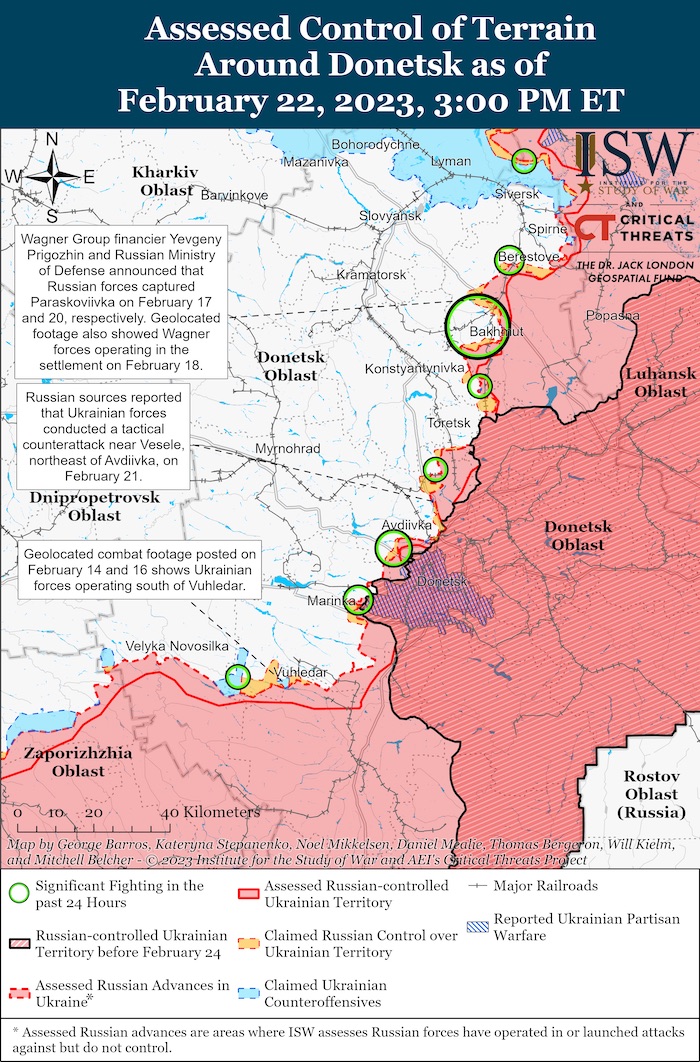
- Bakhmut axis: our defenders repelled enemy attacks in the areas of Bakhmut, Ivanivske, Bohdanivka and Hryhorivka settlements. In particular, Vasyukivka, Orikhovo-Vasylivka, Bakhmut, Hryhorivka, Ivanivske, Kostyantynivka, Mayorsk, Zalizne and New York of the Donetsk region came under enemy fire.
- Avdiivka, Marinka, Shakhtarske axes: Russian forces carried out unsuccessful offensive actions in the districts of Kamianka, Avdiyvka, Severny, Vodyany, Berdychiv, and Marynka. Kamianka, Avdiivka, Berdychi, Orlivka, Tonenka, Severne, Pervomaiske, Nevelske, Pobyeda, Novomykhailivka, Krasnohorivka, Georgiivka, Mariinka, Vugledar, Velyka Novosilka and Neskuchne came under enemy fire.
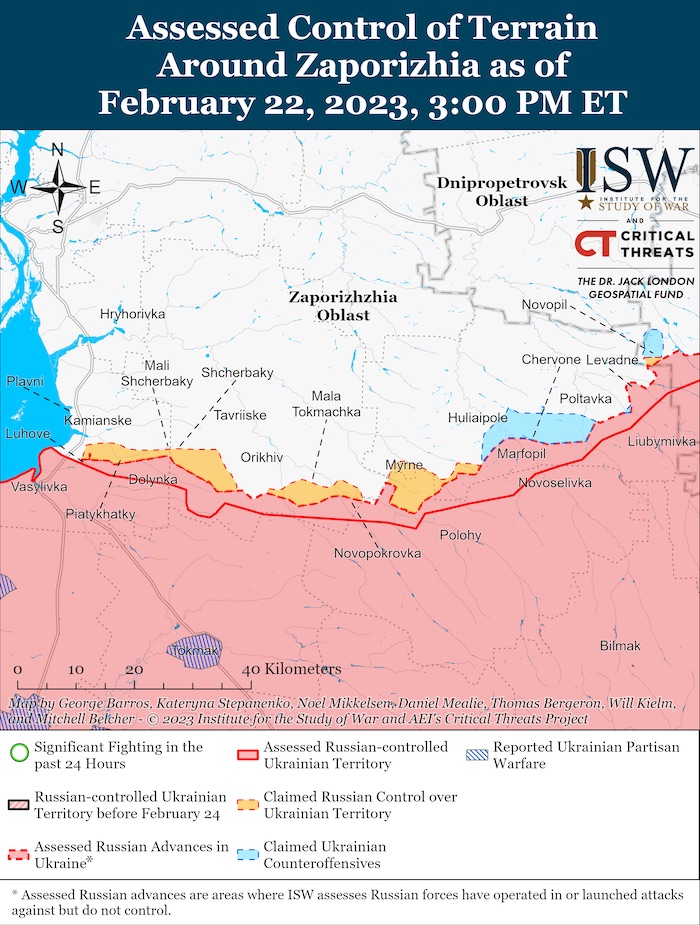
- Zaporizhzhia and Kherson axes: Russian forces are defending. Areas of 27 settlements were shelled. Among them: Olhivske, Charivne, Orihiv and Novodanilivka of the Zaporizhzhia region, as well as Tamarine, Tyaginka, Odradokamyanka, Novotyaginka, Ponyativka, Sadove, Rozlyv and the city of Kherson.
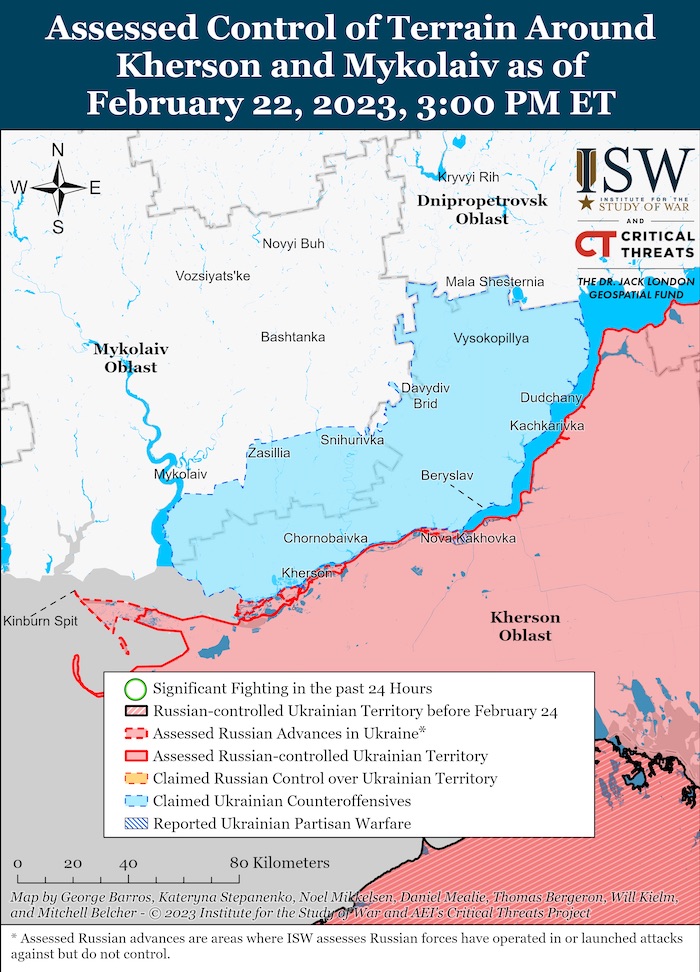
Military Updates
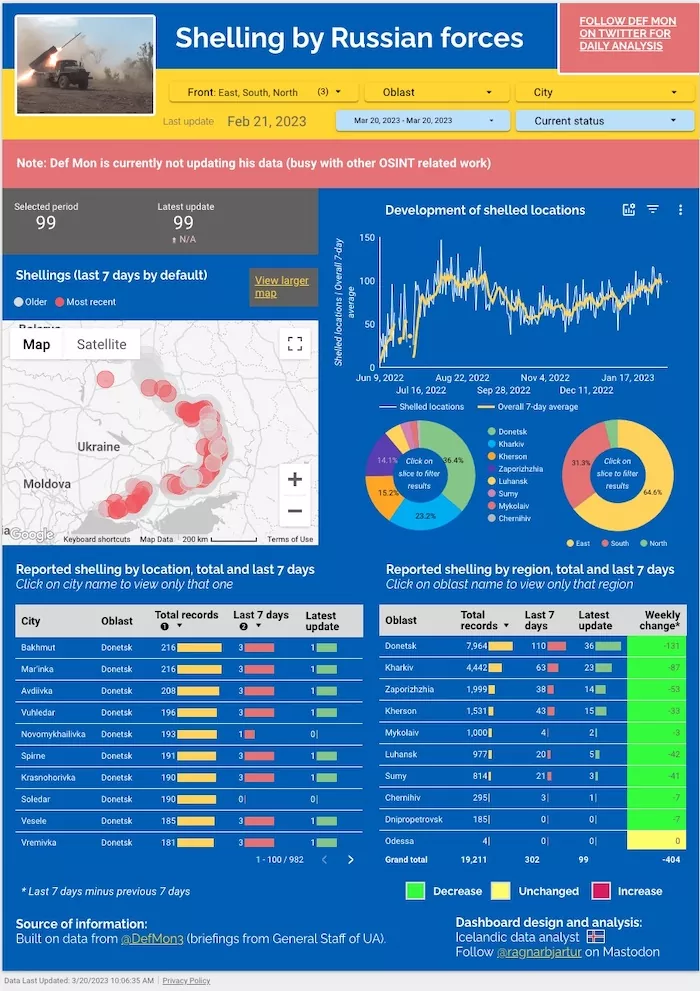
20 Ukrainian soldiers learn how to operate a modern air defense system in Italy - Il Giornale D'Italia
— Euromaidan Press (@EuromaidanPress) March 19, 2023
The Ukrainians learn how to down ballistic missiles & other aerial targets using the missile system SAMP/T that may be deployed to Ukraine next month.https://t.co/IeUs0aP7Vb
- Over the past three weeks, Russian forces have made creeping gains around the Ukrainian-held Donbas town of Avdiivka, immediately north of Donetsk city.
- The Russian operation has largely been carried out by the 1st Army Corps of the Donetsk People’s Republic; local personnel who will know the terrain well. Avdiivka has been on the front line of the Donbas conflict since 2014; the city is now largely destroyed. The sprawling Avdiivka Coke Plant complex is likely to be seen as particularly defendable key terrain as the battle progresses.
- Tactically, the situation is similar to that in the larger town of Bakhmut, further north. Ukrainian forces continue organised defence, but their supply lines to the west are increasingly threatened by the Russian envelopment operation.
- On 3 March 2023, authorities in the Russian-controlled part of Zaporizhzhia Oblast published a decree that declared occupied Melitopol as the oblast capital. The Russian-installed head of the oblast, Evgeniy Balitskiy, said that this was a temporary measure until the city of Zaporizhzhia was controlled by Russia.
- Zaporizhzhia is one of the four oblasts President Putin claimed to have annexed as part of the Russian Federation on 30 September 2022. Russia has never occupied Zaporizhzhia city, a major industrial centre of 700,000 people, which is approximately 35km from the current front line.
- The quiet declaration of an alternative capital is likely tacit acknowledgement within the Russian system that its forces are highly unlikely to seize previously planned major objectives in the near future.
Losses of the Russian army
As of Monday 20 March, the approximate losses of weapons and military equipment of the Russian Armed Forces from the beginning of the invasion to the present day:- Personnel – about 165610 (+700)
- Tanks – 3537 (+5)
- Armoured combat vehicles – 6869 (+16)
- Artillery systems – 2577 (+9)
- Multiple rocket launchers –MLRS - 507 (+0)
- Air defence means – 270 (+2)
- Aircraft - 305 (+0)
- Helicopters - 290 (+0)
- Automotive technology and fuel tanks – 5416 (+8)
- Vessels/boats - 18 (+0)
- UAV operational and tactical level – 2160 (+1)
- Special equipment – 265 (+3)
- Mobile SRBM system – 4 (+0)
- Cruise missiles – 907 (+0)
Humanitarian
- Russian forces shelled Kramatorsk with Smerch and Uragan MLRS. As many as 39 private homes, infrastructure facilities and vehicles were destroyed by enemy strikes. There are killed and injured civilians.
- Russian troops hit Kostiantynivka with Uragan MLRS. As many as 11 apartment blocks and 18 private buildings, educational institutions, garages and cars were damaged. One person was killed and others were injured.
- With the use of rocket artillery, the invaders continue to destroy Bakhmut. Three apartment blocks and two private homes in the city were damaged by enemy fire during the day. Local residents were injured. Four police officers were also injured.
- In the village of Berdychi, civilians were injured in enemy attacks.
Environmental
More than 400,000 Russian shells defused since the beginning of the full-scale war – Zelenskyy, Ukrainska Pravda reports, citing President Zelenskyy’s evening address. "Since the beginning of the full-scale war, our pyrotechnicians and demolition experts have already inspected more than 100,000 hectares of territory. Over 400,000 enemy shells have been neutralised. More than 200,000 explosive items have already been removed."The EU finally proclaimed the need for independence from Russian fossil fuels; yet, European companies are helping Russia expand LNG production, not only paving the way to another dependency but also jeopardizing climate goals.https://t.co/uviVKwIMUv
— Euromaidan Press (@EuromaidanPress) March 19, 2023
Legal
Putin's arrest warrant is a turning point – Zelenskyy, Ukrainska Pravda reports, citing the evening address of President Zelenskyy. "This outgoing week has finally brought a truly significant international legal result for Ukraine, for justice. There is a warrant from the International Criminal Court for the arrest of the head of Russia, and this is a turning point. The moment after which it becomes indisputable that the end of this aggression for Russia will be the full range of its responsibility. Responsibility for every strike in Ukraine, for every destroyed life, for every deported Ukrainian child… And, of course, for every manifestation of the destabilisation of the world caused by Russian aggression". What does the ICC arrest warrant mean for Putin, Reuters asks? “Vladimir Putin may not see the inside of a cell in The Hague any time soon, but his war crimes arrest warrant could hurt his ability to travel freely and meet other world leaders, who may feel less inclined to speak to a wanted man. Putin is just the third head of state to be indicted by the International Criminal Court while still in power. Following is a look at what the consequences could be for the Kremlin leader. The ICC accuses Putin of responsibility for the war crime of deporting Ukrainian children - at least hundreds, possibly more - to Russia. […] The ICC's 123 member states are obliged to detain and transfer Putin if he sets foot on their territory. Russia is not a member, and neither are China, the United States or India, which is hosting a summit later this year of leaders of the G20 group of big economies, which includes Russia. The world's permanent war crimes court was created by the Rome Statute, a treaty ratified by all the EU states, as well as Australia, Brazil, Britain, Canada, Japan, Mexico, Switzerland, 33 African countries and 19 nations in the South Pacific. Russia signed the Rome Statute in 2000 but withdrew its backing in 2016 after the ICC classified Moscow's annexation of Ukraine’s Crimea Peninsula as an armed conflict. Putin is not stupid. He's not going to travel abroad to a country where he might be arrested, said assistant professor of history at the Utrecht University Iva Vukusic. He is not going to be able to travel pretty much anywhere else beyond the countries that are either clearly allies or at least somewhat aligned (with) Russia, Vukusic said.” Ukrainian Intelligence on ICC decision says that Kremlin already looking for a successor to Putin, Ukrainska Pravda reports, citing Andrii Yusov, Spokesman for Ukraine's Defence Intelligence. “Yusov noted that on 17 March, Russian propagandists did not discuss The Hague on their TV shows [although they did comment on it on social media - ed.], because debating this would be a strange and disturbing ‘wake-up call" for the population of the Russian Federation. Putin's circle is narrowing, he is becoming more and more toxic both to the outside world and inside the country. In particular, there is more and more dissatisfaction with what is happening in the Kremlin towers. There is an increasingly grim awareness of the outlook, namely the geopolitical catastrophe of the Putin regime. And yes, we are already talking about finding a successor to Putin, and it is no longer Putin who is looking for one. […] All member states of the International Criminal Court are now legally required to detain and detain Russian President Vladimir Putin as a suspect.”Since 24 Feb, 21,965 Ukrainian civilian casualties, & 13,734 injured; 8,231 killed - over 5000 adults & over 400 children whose sexes were identified. Actual casualties are higher, as there are delayed and unconfirmed reports from intense fighting areas.https://t.co/iMbC5b7eLx
— Euromaidan Press (@EuromaidanPress) March 19, 2023
Support
Vladimir Putin will be arrested in Germany if he comes there, German Justice Minister Buschmann says
— Euromaidan Press (@EuromaidanPress) March 19, 2023
Germany is obliged to detain Putin and hand him over to the ICC in the Hague if Russia's President enters the territory of Germany, Buschmann said.https://t.co/QszS2Qx0xh
New Developments
#Putin visits #Mariupol in #propaganda stunt by night to conceal how #Russia has totally destroyed this city in Ukraine #StandWithUkraine #RussiaWarCrimes #StopRussia #https://t.co/g7QgJ9wXBI
— Euromaidan Press (@EuromaidanPress) March 19, 2023
- Polish Ambassador to France: Poland will be forced to enter the war if Ukraine fails to defend itself, Ukrainska Pravda reports, citing LCI and Rzeczpospolita. "It is not NATO, Poland or Slovakia that are mounting ever more pressure, but Russia, which has invaded Ukraine. Russia, which is seizing its territories. Russia, which is killing its people. And Russia, which is abducting Ukrainian children. Therefore, either Ukraine will defend its independence today, or we will have to enter this conflict. Because our main values, which were the basis of our civilization and our culture will be threatened. Therefore, we will have no choice but to enter the conflict."
- Russia's Investigative Committee reacts to the German Justice Minister's statement on Putin's arrest, Ukrainska Pravda reports, citing the Investigative Committee of Russia. “Alexander Bastrykin, Head of Russia's Investigative Committee, has tasked the Russian Prosecutor General with giving a legal assessment of the German Justice Minister's statements regarding dictator Vladimir Putin’s arrest. […] Marco Buschmann, the German Justice Minister, has announced that hewill execute an arrest warrant for Russian President Vladimir Putin if he sets foot on German soil.”
- Putin visits Mariupol as part of a surprise tour of occupied Ukraine, Reuters “President Vladimir Putin made a surprise weekend visit to the war-ravaged port of Mariupol, state media reported, the Kremlin leader's first trip to the Russian-occupied territories of Ukraine's Donbas region since the conflict began. The visit came after Putin travelled to Crimeaon Saturday in an unannounced visit to mark the ninth anniversary of Russia's annexation of the peninsula from Ukraine, and just two days after the International Criminal Court (ICC) issued an arrest warrant for the Russian leader.”
- Putin once again brings up "diplomatic settlement" ahead of Xi Jinping's visit, Ukrainska Pravda reports, citing Kremlin’s website. "Russia is open to a political and diplomatic settlement of the Ukrainian crisis. However, peace talks were halted back in April 2022, and we were not the ones to do it. The future of the peace process depends solely on commitment to a serious conversation which takes into account the current geopolitical reality. Unfortunately, any ultimatums aimed at Russia only show how [those who make such ultimatums] are detached from this reality and uninterested in finding a solution to the current situation. Putin also thanked China for what he called "the Chinese People’s Republic’s balanced stance on events taking place in Ukraine" and for the country’s understanding of these events’ antecedents and true causes. He welcomed China’s preparedness to"play a constructive part in the war’s settlement.”
Russia did not invade Ukraine following the annexation of Crimea in 2014 due to a lack of necessary weaponry, Vladimir Putin says
— Euromaidan Press (@EuromaidanPress) March 19, 2023
"We had no hypersonic weapons back then," Putin told a Russian propagandist Pavel Zarubin.https://t.co/PZGu3Vp3Rv
Assessment
https://www.understandingwar.org/backgrounder/russian-offensive-campaign-assessment-february-22-2023*- On the war.
The Institute for the Study of War has made the following assessment as of March 19, 2022:
- Russian forces continued limited offensive operations along the Kupiansk-Svatove-Kreminna line.
- Russian forces likely secured marginal gains near Bohdanivka (6km northwest of Bakhmut) amidst continued Russian offensive operations in and around Bakhmut.
- Russian forces continued offensive operations along the outskirts of Donetsk City and may have advanced towards Berdychi, about 10km northwest of Avdiivka.
- Russian forces continued erecting defensive fortifications throughout southern Ukraine.
- Unknown actors killed a Russian occupation Ministry of Internal Affairs Patrol Service platoon commander with a car bomb in occupied Kherson Oblast. Ukrainian media hypothesized that the attack may have been a partisan attack or a result of Russian infighting.
- Consequences and what to do?

